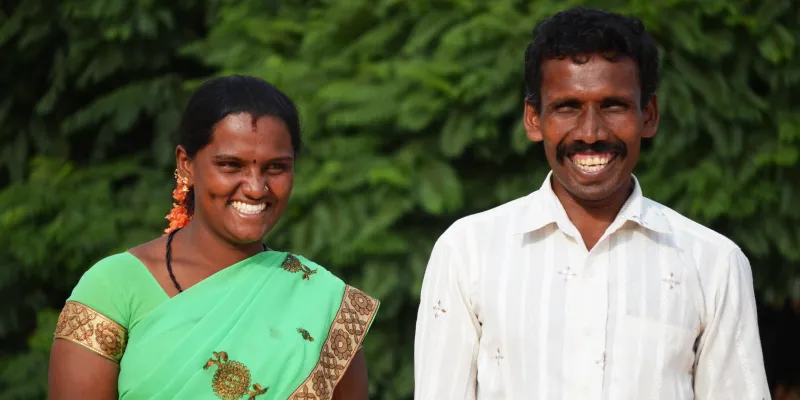[Survivor Series] We heard stories of other labourers who had died under mysterious circumstances and were buried in the kiln itself
In this week’s Survivor Series story, Kenchappa tells us how he and his family were working under inhuman conditions at a brick kiln. Today, he campaigns to free bonded labourers and help them lead a better life.
Our troubles began with what should have been a happy occasion. It was my brother’s wedding, and we had taken a loan of Rs 15,000 to host it. A friend of ours had arranged for the loan from the owner of a brick kiln in Jigani, Karnataka. After the wedding, my brother moved to Tamil Nadu where his in-laws lived, and my parents, wife, and I moved to work at the kiln to pay off the loan. It seemed like a straightforward way to settle our debts.
We soon realised that we had made a huge error of judgement. The kiln owner exploited us from the beginning, and we worked in inhuman conditions. Our day began at 4 am along with the other labourers at the kiln. My job was to load the bricks onto the trucks, ferry them to various destinations, and unload them there. Meanwhile, my wife and parents worked at the kiln, manually sieving the mud that was used to make the bricks for the day. I’d join them on my return and we would have to work late into the night.

Kenchappa and his wife Savita were freed from a brick kiln in Karnataka. Today, they till their own land and even hire former bonded labourers, so they also know what it's like to work and live as free people.
Image: IJM
We were paid Rs 500 a week, together, for all our hard work. This was barely enough for our groceries and food, which we had to buy ourselves. Only one of us could leave the kiln once a week to buy the groceries. If we requested the owner for a single day off, he would remind us of the debt and told us that we now owed him Rs 35,000 because of the interest on the initial loan.
When we raised questions as to why we were being paid so little and why our debt had increased, we were beaten, abused, and threatened. I used to get very upset when the owner abused my wife in the worst kind of language. We were constantly watched by the owner’s henchmen so we could not even think of escaping.
There were stories about how other labourers had died under mysterious circumstances and were buried in the kiln itself. We lived in constant fear that anything could happen to us, and that even if we escaped, they would find us and bring us back.
It was four years before I met a field worker from an NGO in Bangalore with whom I shared my plight. He assured me that he would get help and there was a way out. This was the first time in four years that my wife and I had a glimmer of hope for freedom. About a week after this, the police and government officials came to the kiln looking for us along with workers from the NGO.
There were six other families working in the kiln along with us at the time. Initially, we were afraid when we saw the police, but slowly, we gathered the courage and shared our story with the officials, first at the kiln and later that day in the Jigani police station. We finally believed that a better life awaited us.
Since our rescue in 2013, my family and I have been living in our ancestral village, which is about 30 km from Kanakapura in Ramanagara District. We have some land here and we're also given some land by the government under a scheme. Initially, after the rescue, I was working in different agricultural fields around the district as a daily wage labourer.
A few years ago, my wife and I decided to cultivate our own land and we have been cultivating millets, groundnuts, and vegetables since then. We are very happy to work on our own land. I take care of the cultivation while my wife looks after a few goats and cows that we have bought. My parents live close by and I support them as well.
We recently laid the foundation for a new home on our land and I am waiting for the government to construct us a house under the Pradhan Mantri Awas Yojana scheme. In 2019, I became one of the leaders in Udyonmukha, an association for released bonded labourers in Karnataka. We have about 80 former bonded labourers, the majority of whom were rescued in and around my district. As a part of Udyonmukha, I meet with government officials in my district to help the rescued labourers get the benefits due to them.
I also hire workers from our rescued bonded labourers’ community when I need additional help on my agricultural land. We usually live and work together during the harvesting season and it is a joyous occasion for us. We sometimes talk about the past but mostly we are all just happy to be working and living as free people.
(Story courtesy: International Justice Mission)
Edited by Diya Koshy George

![[Survivor Series] We heard stories of other labourers who had died under mysterious circumstances and were buried in the kiln itself](https://images.yourstory.com/cs/5/f5a7f3304b1211e9b6645b8ae897d03e/SS1-1612070601824.png?mode=crop&crop=faces&ar=2%3A1&format=auto&w=1920&q=75)
![[Survivor Series] ‘I was diagnosed with PTSD after being rescued from a brothel’](https://images.yourstory.com/cs/5/f5a7f3304b1211e9b6645b8ae897d03e/survivor1-1609134005148.png?fm=png&auto=format&h=100&w=100&crop=entropy&fit=crop)




